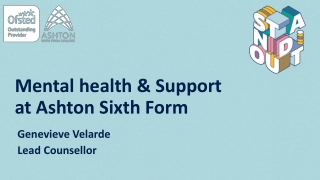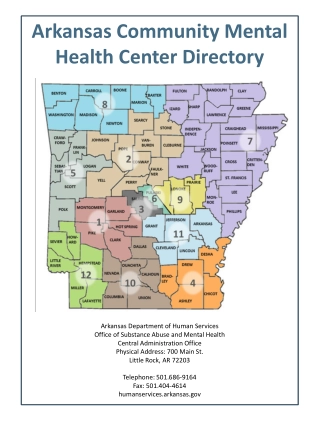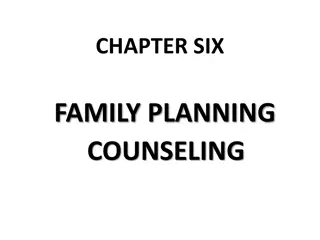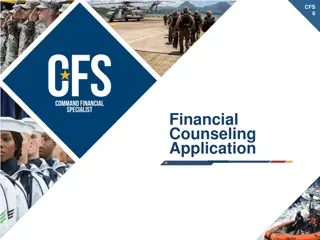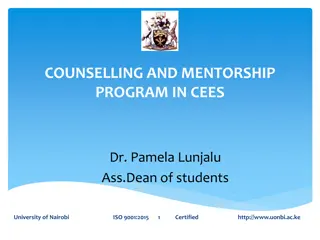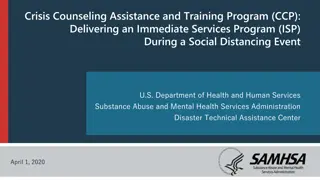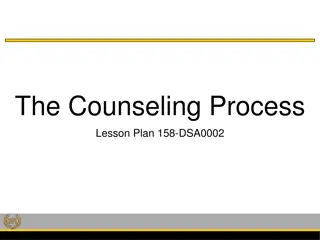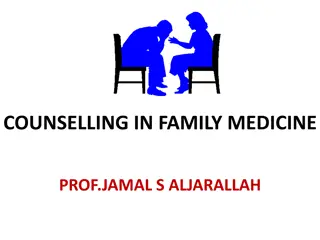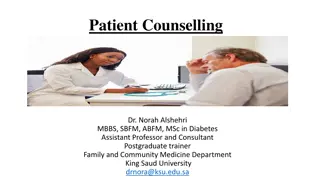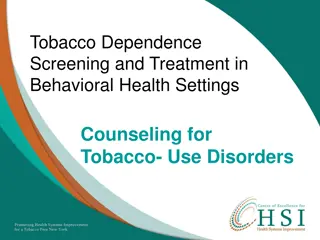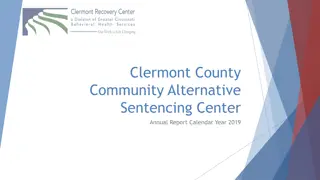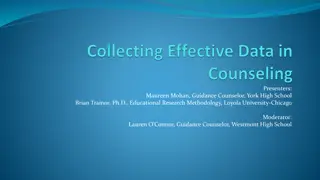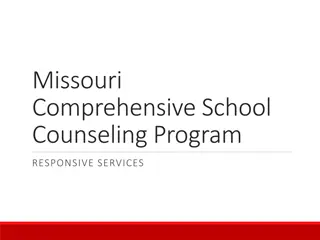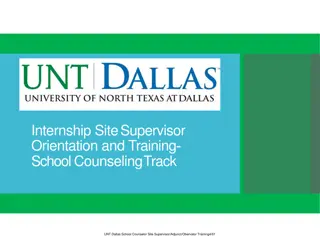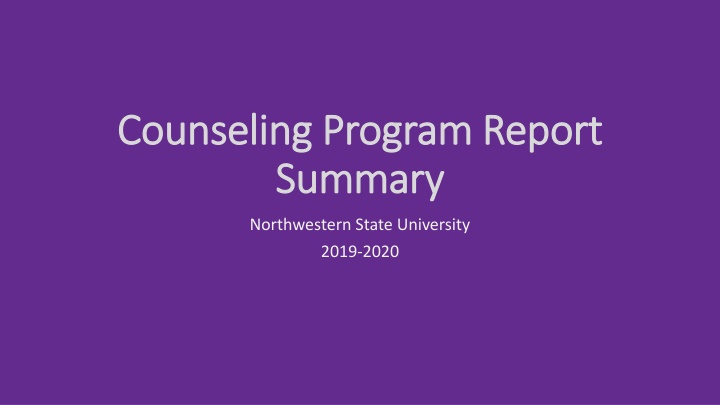
Northwestern State University Counseling Program Report Analysis 2019-2020
Explore the assessment of counseling program objectives at Northwestern State University for 2019-2020, including detailed statistics, strengths, and future improvements based on student feedback. The report covers concentrations in CMHC and School Counseling, highlighting areas of focus and performance against standards.
Download Presentation

Please find below an Image/Link to download the presentation.
The content on the website is provided AS IS for your information and personal use only. It may not be sold, licensed, or shared on other websites without obtaining consent from the author. If you encounter any issues during the download, it is possible that the publisher has removed the file from their server.
You are allowed to download the files provided on this website for personal or commercial use, subject to the condition that they are used lawfully. All files are the property of their respective owners.
The content on the website is provided AS IS for your information and personal use only. It may not be sold, licensed, or shared on other websites without obtaining consent from the author.
E N D
Presentation Transcript
Counseling Program Report Counseling Program Report Summary Summary Northwestern State University 2019-2020
Northwestern State University Assessment of Counseling Program Objectives (2019-2020) Objective Content Area NSU Comprehensive Exam Percentage NCE National Statistical Summary (2016) 80% #1 Professional Functioning/Helping Relationships Multicultural/Cultural Contexts 70% 78% #2 76% 76% #3 Human Growth/Development 71% 66% #4 Career Development/Life Factors 63% 73% #5 Counseling Process/Professional Orientation 73% 66% #6 Group Counseling 63% 66% #7 Assessment 68% 60% #8 Research/Program Evaluation 60% Student Overall Ratings - Excellent At least two professional development opportunities were offered each semester. #9 Field Experiences #10 Professional Development
CMHC Concentration Percentages for each standard were either at Target (90% or higher) or Acceptable (80-89%) Strengths: Strong clinical portfolios (Practicum and Internship I/II) Counseling Process Multicultural Counseling Areas for Focus: Research Analysis
School Counseling Concentration Percentages for each standard were either at Target (90% or higher) or Acceptable (80-89%) Strengths: Intro School Counseling Multicultural Counseling Strong clinical portfolios (Practicum and Internship I/II) 100% Pass Rate for PRAXIS Areas for Focus: Research Analysis
Looking Forward Based on student feedback, surveys, and assessments, the faculty will be implementing the following actions for Fall, 2020 to improve student learning: For Research (EDUC 5010), the instructor of the course (EDUC 5010 online) will design and conduct a WebEx session on different research methods to enrich students understanding. For Analysis of the Individual (EPSY 5520) the instructor added a number of WebEx sessions/recordings last Fall which received positive feedback from the students. The instructor will continue offering those recordings and add additional synchronous WebEx instruction so students have an opportunity to ask questions and interact in real-time. In COUN 5610 a Class Journal/Portfolio is used to assess the KPI for 2.d. This assignment was completed, and data was successfully collected in the Spring 2020 semester. However, based on instructor feedback and student questions around the assignment, the following changes will be implemented to seek further improvement in the quality of instruction and student work: (1) a template will be provided, (2) each entry will be aligned with the requisite CACREP Standards, and (3) a more descriptive rubric will be created. An Article Screening in EDUC 5010 is used to assess the KPI for 8.a. The number of COUN students completing this course in the Spring was low (n=3) so it is difficult to draw conclusions on the limited data. However, in reflection on instruction and in answering student questions, the instructor has determined additional instructional content, such as a supplementary handout with content regarding what to look for in articles, would improve the quality of instruction and student work.
Areas of Strength from 2019-2020 Consistency in Field Experience Coursework Counseling/Helping Relationships Faculty attended professional development regarding Quality Matters for online teaching Faculty incorporated activities to help students thoroughly ground technique in their theory of choice. The following professional developments were offered in the Fall 2019: (1) Suicide prevention and ethical obligations, (2) ethics and counselor boundary issues, and (3) ethical considerations in dealing with physically aggressive clients. Due to COVID-19, the focus in the Spring shifted to working with clients online and the legal/ethical issues surrounding telecounseling. The move to the 2016 CACREP Standards went into effect in the Spring of 2020. KPI data was collected for the Spring of 2020. Objectives were approved by the Advisory Committee prior to the start of the Spring semester. The complete report can be accessed at: https://www.nsula.edu/documentprovider/docs/545/Counseling%20MA%20(533)%20AC%202019- 2020%20Assessment%20(7%20July%2020).pdf

